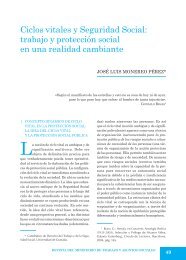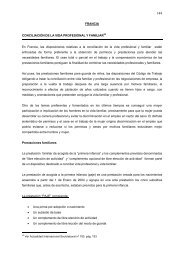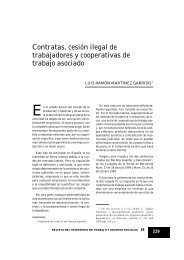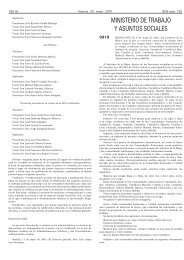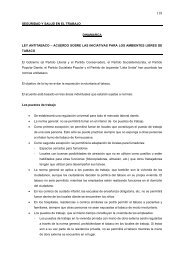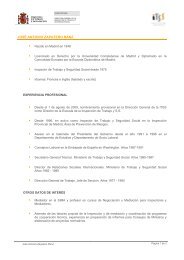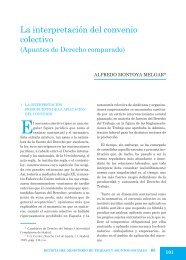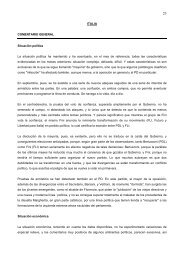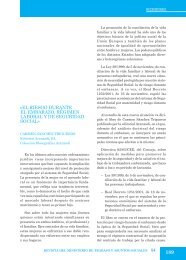Número 93: Derecho del Trabajo - Ministerio de Empleo y ...
Número 93: Derecho del Trabajo - Ministerio de Empleo y ...
Número 93: Derecho del Trabajo - Ministerio de Empleo y ...
Create successful ePaper yourself
Turn your PDF publications into a flip-book with our unique Google optimized e-Paper software.
R. YOLANDA QUINTANILLA NAVARRO<br />
ble a unos y otros, y conocer en un solo Texto el régimen jurídico <strong>de</strong> cada figura o institución<br />
que afecte a los empleados públicos. Solo <strong>de</strong> esta manera se pue<strong>de</strong>n conocer los puntos<br />
<strong>de</strong> conexión y los <strong>de</strong> divergencia <strong>de</strong> forma clara, y se pue<strong>de</strong> luchar más por homogeneizar<br />
sus situaciones. Se ganaría en seguridad jurídica y en claridad a la hora <strong>de</strong> hacer interpretaciones<br />
<strong>de</strong> las normas, evitando tantas remisiones y plasmando la verda<strong>de</strong>ra intención <strong><strong>de</strong>l</strong><br />
legislador.<br />
ABSTRACT The list of rights mentioned is a combination of rights of different nature and with different<br />
legal protection. They are organized randomly and they inclu<strong>de</strong> generic or non-specific fundamental<br />
rights (such as freedom of speech, right to privacy, right to non-discrimination,<br />
and so on), other rights acknowledged to workers at large, such as the right to an effective<br />
safety and health protection, and a third group of rights acknowledged just to public<br />
employees, such as the right to legal protection and <strong>de</strong>fence.<br />
Within the third group of rights, i.e. those accor<strong>de</strong>d to public employees, not all rights are<br />
acknowledged, strictus sensi, to all public employees. For example, the right of irremovability<br />
of civil servants, as established in the Basic Statute of Public Employees, article<br />
14. a).<br />
EBEP's article 14, letter q) states that public employees are also accor<strong>de</strong>d "all other rights<br />
acknowledged by the legal system". Thus, legislators clarify that the list inclu<strong>de</strong>d in article<br />
14 of EBEP is not restrictive, and that it can and should be completed with other rights<br />
which are established or <strong>de</strong>veloped by legal sectorial rules or legislation. This is the case<br />
of contract personnel, who will enjoy rights accor<strong>de</strong>d by labour legislation to all workers,<br />
as well as those inclu<strong>de</strong>d in article 14 of EBEP, even though some of these rights will need<br />
to be explained further.<br />
EBEP's article 14 inclu<strong>de</strong>s some new aspects. On the one hand, civil servants have the<br />
right to contribute towards the achievement of their <strong>de</strong>partment's objectives ?EBEP, article<br />
14. e)?. On the other hand, contract personnel have the right to legal <strong>de</strong>fence with<br />
regards to proceedings <strong>de</strong>rived from the legitimate exercise of their functions or public<br />
roles ?EBEP, article 14. f)?.<br />
Most of the individual rights recognised by article 14 are partially <strong>de</strong>veloped within EBEP<br />
text. However, the content of such legal regime is only partial and must be completed by<br />
means of <strong>de</strong>veloping the Public Office Laws and their relevant regulations. This applies,<br />
for instance, to remuneration rights (except remuneration of acting civil servants), which<br />
will be applied once Public Office Laws are <strong>de</strong>veloped and come into force in accordance to<br />
EBEP (final provision 4).<br />
Furthermore, the list of rights could be expan<strong>de</strong>d as a result of collective bargaining.<br />
EBEP's article 14 is of a basic nature, meaning that one of its most important legal consequences<br />
is that it provi<strong>de</strong>s fixed legal conditions, unalterable by collective bargaining<br />
with regards to the rights accor<strong>de</strong>d to civil servants.<br />
EBEP is a new legislation that acknowledges principles and concepts which are trying to<br />
serve as a meeting point for civil servants and contract personnel. However, legislators<br />
try to govern many common contents specifically for civil servants, recognizing their<br />
incompetence to do so as well as the legal vacuum until Public Office Laws <strong>de</strong>veloping<br />
EBEP are passed.<br />
However, EBEP legislators are more successful when they refer the legislation of content<br />
specific to contract personnel, because they have legal regimes with which they can avoid<br />
any legal gap.<br />
In other words, EBEP is the result of a consolidated request for a joint and basic regime<br />
applicable to both public employees and contract personnel. However, it becomes clear<br />
throughout its articles that regimes to be applied are actually separated, that EBEP's legislators<br />
have no legal competence to <strong>de</strong>velop aspects related to civil servants, which therefore<br />
remain unresolved, and that legislators also lack the necessary competence to legis-<br />
REVISTA DEL MINISTERIO DE TRABAJO E INMIGRACIÓN <strong>93</strong><br />
145



